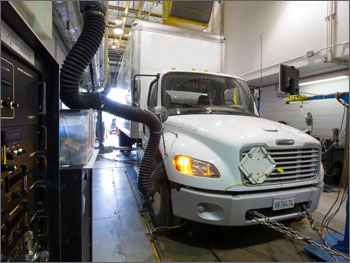Renewable Fuels and Lubricants Laboratory

The heavy-duty chassis dynamometer at the ReFUEL Laboratory simulates on-road driving
in a controlled laboratory setting.
Photo by Dennis Schroeder, NREL
NREL's Renewable Fuels and Lubricants (ReFUEL) Laboratory is a state-of-the-art research and evaluation facility for advanced fuels and vehicles. Research and development focuses on overcoming barriers to the increased use of renewable diesel and other nonpetroleum-based fuels, such as biodiesel and synthetic diesel derived from biomass, and improving vehicle efficiency.
The ReFUEL Laboratory houses the following specialized equipment. Refer to the ReFUEL Laboratory fact sheet for detailed specifications.
Heavy-Duty Chassis Dynamometer
The heavy-duty chassis dynamometer, paired with laboratory-grade emissions analysis equipment, simulates on-road driving under controlled conditions inside the ReFUEL Laboratory. Because an entire vehicle is evaluated instead of just an engine, and a driver controls the vehicle instead of a computer, the chassis dynamometer allows researchers to assess "real world" emissions. The dynamometer is supported by 72 data acquisition channels along with fuel metering and combustion analysis subsystems. It can accommodate medium- and heavy-duty vehicles from small trucks and delivery vans to full-size buses and Class 8 tractors.
Heavy-Duty and Light-Duty Engine Dynamometer Test Cells
The ReFUEL Laboratory features two engine dynamometer test cells—one for heavy-duty (up to 600 hp) engines and another for light-duty (up to 75 hp) engines.
Heavy-Duty
Heavy-duty engines are certified as meeting emission regulations by the manufacturer using an engine dynamometer. These protocols, known as the Heavy-Duty Federal Test Procedures (HD-FTP), are highly standardized, and results can be readily compared between laboratories. The heavy-duty engine dynamometer test cell can perform the HD-FTP on engines up to 600 hp operating at up to 6,500 rpm; in addition, the test cell enables the evaluation of motors and transmissions. Advanced controls and data acquisition systems allow custom tests to be established beyond the FTP. A combustion analyzer records information about cylinder pressure, fuel-injection timing, and valve position.
Light-Duty
The light-duty engine dynamometer test cell was designed as a one-of-a-kind single-cylinder research device for light-duty engines operating on biofuels. It utilizes a 75 hp AC dynamometer. Like the heavy-duty engine dynamometer test cell, it can run a series of transient or steady-state cycles. It includes a single-cylinder engine with a wall-guided spark-ignition direct-injection combustion system. A maximum fuel pressure of 6,000 psi allows for the use of future-generation direct injectors while the engine controller provides flexible, independent control for fuel-injection timing, high-pressure fuel delivery, spark timing, exhaust gas recirculation, and boost pressure.
Emissions Analysis Equipment
To accurately measure emissions at very low levels, the ReFUEL Laboratory has an advanced emission measurement system with supplemental air and fuel conditioning to ensure repeatability. This system is based on the full-scale dilution tunnel method with a constant velocity sampling system for mass-flow measurements. Capabilities include continuous measurement of gaseous emissions of total hydrocarbons, oxides of nitrogen, carbon monoxide, carbon dioxide, ammonia, and nitrous oxide via in-lab emissions benches and a portable emissions measurement system. The system can also measure particulate matter and additional unregulated emissions.
Although the Renewable Fuels and Lubricants Laboratory does not offer certification services, the facility follows 2007 Code of Federal Regulations emissions requirements, which are still applicable today.
Because the ReFUEL Laboratory is located in Denver, Colorado, it offers the additional capability of evaluating emissions and vehicle performance at high altitude. It also features an altitude simulation system to mimic results found at lower altitudes, including sea level.
As a complement to these capabilities, detailed studies of fuel properties, with a focus on ignition quality, are performed at NREL's Fuel Combustion Laboratory. The Renewable Fuels and Lubricants Laboratory supports NREL's fuels performance, fleet evaluation, and secure transportation data projects.
Working with the Renewable Fuels and Lubricants Laboratory
The ReFUEL facility is available to members of the research community interested in analyzing advanced fuels, prototype engines, and hybrid powertrains for next-generation vehicle technologies. Learn about working with us or contact Jonathan Burton to explore collaborative opportunities with NREL's ReFUEL Laboratory.
Share
